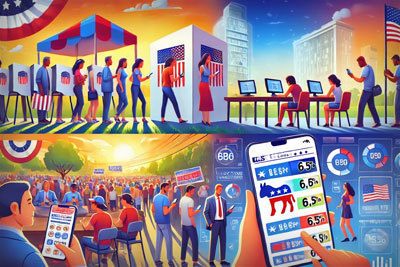
Prediction markets, often structured as derivatives exchanges offering “yes/no” event contracts, have been around for years but faced regulatory hurdles. However, a recent court ruling has redefined their place in the landscape. On October 2, the US Court of Appeals for the District of Columbia ruled in favor of Kalshi, a New York-based platform, allowing it to list contracts related to Senate and House control. The Commodity Futures Trading Commission (CFTC) had previously delisted these contracts in June, arguing that they resembled gaming. Kalshi countered that regulated, legal markets offer a safer alternative to unregulated ones, where the accuracy of real-time data could enhance voter engagement and combat misinformation.
Contract Growth on Kalshi Reaches New Highs
Since the court ruling, Kalshi has seen a surge in activity. As of October 15, the platform had $15 million in political contracts, but by November 3, that figure had climbed to over $250 million, with the presidential race alone accounting for $184 million. Despite this growth, contracts concerning Senate and House control, the initial focus of the CFTC’s concerns, have generated less than $1 million each, indicating smaller interest compared to high-stakes presidential predictions.
Competing Platforms and Market Leader Polymarket
Kalshi may have achieved legal status in the US, but Polymarket, an unregistered crypto-based platform also headquartered in New York, has maintained its market leadership with over $3 billion in contracts for this election cycle. Although Polymarket is technically inaccessible to US users due to CFTC scrutiny, it remains a significant player globally. In contrast to Kalshi, Polymarket has no CFTC registration, and regulation may prove challenging, as detailed in Fortune.
Another prominent player, PredictIt, based in New Zealand and operated by the Victoria University of Wellington, claims to be a research tool rather than a gambling platform. However, the CFTC moved to revoke its “No Action Letter” in March 2023, creating uncertainty about the platform’s future in the US. In a notice to users, PredictIt acknowledged the legal limbo, allowing traders to continue holding and trading contracts pending a final court decision. PredictIt doesn’t display dollar amounts for contracts, but it lists 10.9 million active shares in the presidential election, indicating substantial interest.
Kalshi’s Marketing Shift and Expanding Appeal
Now recognized as the first legal, regulated prediction market in the US, Kalshi’s messaging has evolved to attract broader audiences. In its defense against the CFTC, the company positioned itself as a hedging tool for political risks rather than a betting platform. However, Kalshi’s recent marketing materials use betting language more freely. For instance, its X account bio now describes it as “The first legal way to bet on the election in America.” CEO Tarek Mansour appeared in a Times Square video on Instagram, stating, “It’s actually an app and a website where you can bet on anything. We’re the first platform that legalised betting on the US election.”
Kalshi’s advertisements have spread beyond Times Square to the Las Vegas Strip, a hub for gaming, underscoring the platform’s appeal in traditional betting spaces.
Robinhood’s Entry and Broader Implications
On October 28, stock trading platform Robinhood announced plans to offer election contracts to US users, a move that could disrupt the political prediction market. With its massive user base, Robinhood may draw significant interest. Sports betting investor Chris Grove highlighted Robinhood’s influence, noting that it “towers over US online betting companies by many key metrics.” According to recent figures, Robinhood had 24.2 million funded accounts and 11.8 million monthly active users as of the second quarter of 2024, dwarfing many online betting platforms.
Accuracy and the Future of Prediction Markets
Prediction markets could serve as a valuable tool to combat misinformation, with platforms like Kalshi suggesting that their odds may offer credible insight. Currently, Kalshi’s odds differ from traditional polling data. On Kalshi, Donald Trump has been the favorite for weeks, with a 52%-48% lead over Kamala Harris as of November 3. On Polymarket, Trump holds a 54%-46% advantage. In contrast, traditional polling outlets like FiveThirtyEight show a tighter race, with Harris narrowly leading.
Limited Response from the Gambling Industry
The rapid rise of prediction markets has drawn little response from the established gambling industry. Some former regulators declined to comment, citing a lack of familiarity with prediction markets. Nonetheless, the shifting regulatory landscape has raised questions, especially as Kalshi’s messaging now openly references betting. Las Vegas consultant Brendan Bussmann commented on this shift, noting the tension it creates with federal and state regulations.
As the CFTC continues to examine these markets, it remains unclear how the legal framework will evolve. For now, prediction markets like Kalshi, Polymarket, and PredictIt are set to play a significant role in the upcoming election, marking a new chapter in the intersection of finance, betting, and political engagement.
Sources:
Prediction Markets Surge as US Election Approaches, igamingbusiness.com, November 5, 2024
Betting Markets Narrow as Election Day Nears, usatoday.com, November 4, 2024



